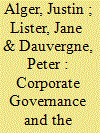| Srl | Item |
| 1 |
ID:
142236


|
|
|
|
|
| Summary/Abstract |
This article critically investigates the growing power and effectiveness of the ‘ethical’ compliance audit regime. Over the last decade, audits have evolved from a tool for companies to track internal organisational performance into a transnational governing mechanism to measure and strengthen corporate accountability globally and shape corporate responsibility norms. Drawing on original interviews, we assess the effectiveness of supply chain benchmarks and audits in promoting environmental and social improvements in global retail supply chains. Two principal arguments emerge from our analysis. First, that audits can be best understood as a productive form of power, which codifies and legitimates retail corporations’ poor social and environmental records, and shapes state approaches to supply chain governance. Second, that growing public and government trust in audit metrics ends up concealing real problems in global supply chains. Retailers are, in fact, auditing only small portions of supply chains, omitting the portions of supply chains where labour and environmental abuse are most likely to take place. Furthermore, the audit regime tends to address labour and environmental issues very unevenly, since ‘people’ are more difficult to classify and verify through numbers than capital and product quality.
|
|
|
|
|
|
|
|
|
|
|
|
|
|
|
|
| 2 |
ID:
184647


|
|
|
|
|
| Summary/Abstract |
A handful of companies dominate the world’s shipping industry. These firms have gained political leverage over the global governance of container shipping in particular. Intriguingly, in recent years the Danish conglomerate Maersk—the world’s biggest container and shipping vessel company since the mid-1990s—has been using its influence to push for higher environmental standards for the industry as a whole. To some extent these initiatives are helping to promote environmental efficiencies, cleaner fuels, and greener technology. But they are also raising costs for small and midsized companies with extremely low profit margins, further enhancing the competitiveness of the biggest shipping conglomerates in an increasingly oligopolistic market. While voluntary self-governance by companies such as Maersk is incrementally improving the environmental management of global shipping, it is also further concentrating governance power within a few transnational corporations, potentially taking more ambitious regulation off the agenda.
|
|
|
|
|
|
|
|
|
|
|
|
|
|
|
|